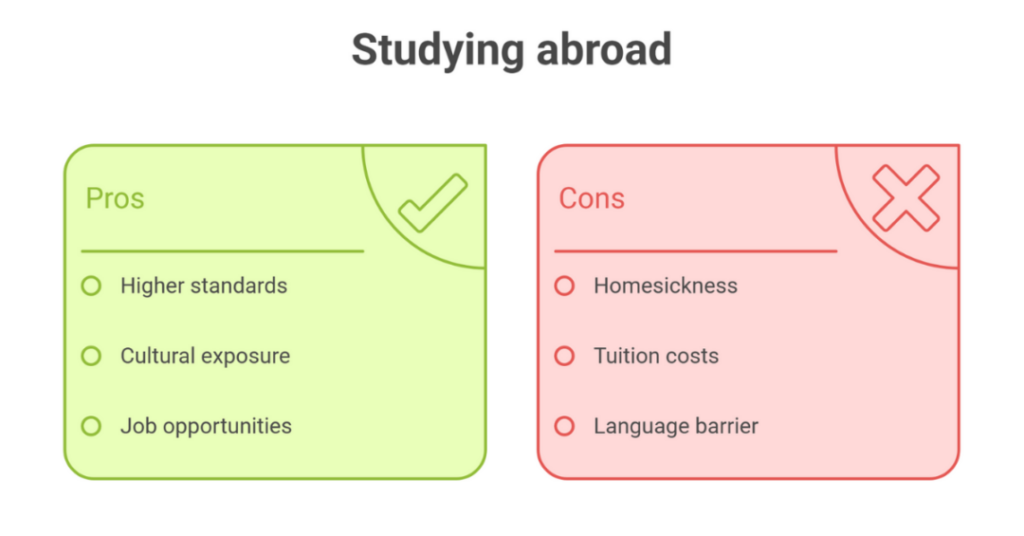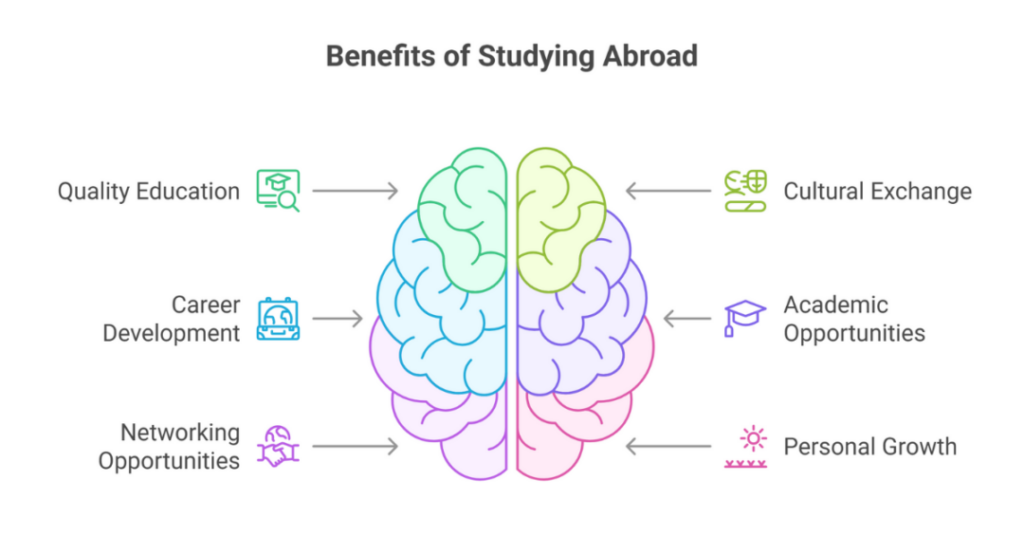19 August 2025
6 minutes read
What are the Advantages and Disadvantages of Studying Abroad (10 Best Pros and Cons of Studying Abroad for Indian Students)?

Key Takeaways
- Advantages and disadvantages of studying abroad reveal global exposure and career growth versus high tuition and homesickness.
- Advantages and disadvantages of studying abroad highlight cultural learning and language skills against culture shock and barriers.
- Advantages and disadvantages of studying abroad show a transformative journey balanced by challenges of living away from home.
Studying abroad is one of the most life-changing things any student can do, particularly Indian students looking to experience education in different countries. A chance to study abroad allows students to study a higher academic standard, it can expose students to a different culture, and it also opens up potential job options around the world.
While studying abroad is easily a once-in-a-lifetime experience, there are both pros and cons studying abroad offers. Studying abroad means living in a foreign country and adapting to a new culture, facing homesickness, paying tuition, and potentially overcoming a language barrier.
International students often find themselves living half a world away from everything and missing home during the holiday season, while also trying to figure out life on their own. However, as with any foreign exchange experience, the benefits of studying abroad typically outweigh negatives.
This article covers everything you need to know about studying abroad including the advantages and disadvantages, pros and cons, and how study abroad students can make informed choices before making the move abroad to further their studies.
How to Judge the Advantages and Disadvantages of Studying Abroad?
Fun fact: Approximately 1 million international students go abroad to study higher education each year. Whether studying abroad is beneficial for you depends on your priorities and whether you can acclimatize to a foreign environment.

Here are some points to evaluate the pros and cons to study abroad:
- Personal Prospects: Only study abroad if the education in foreign countries fits your future career objectives.
- Finances: International students pay higher tuition fees and living costs and have increased ancillary cost such as transcript requests.
- Adaptability: Students studying abroad must prepare for culture shock, homesickness and language barriers.
Comparison Chart: How to Evaluate the Pros and Cons
| Factor | Advantage | Disadvantage |
|---|---|---|
| Education Quality | You get a world-class education overseas | More expensive tuition fees for overseas students |
| Cultural Exposure | You get to experience and learn about new cultures and traditions | You may experience culture shock and have to adapt to a new culture |
| Language Development | You may be able to learn a new language and/or develop your language skills | You will need to work through a language barrier |
What are the Benefits of Studying Abroad?
Fun fact: International students who study abroad tend to have better cross-cultural communication skills than their peers who stay at home. First-hand experience in new cultures and professional development, studying abroad provides students with both.
Some benefits of studying abroad are:
- Quality Education: Studying abroad provides access to universities ranked as the best in the world with outstanding research facilities.
- Cultural Exchange: Students who study abroad are connected to people who are from a different culture than their own, exposing new perspectives.
- Career Development: Studying abroad leads students to international career opportunities, often with a better salary.
The following table summarizes the benefits of studying abroad:
| Benefit | Explanation |
| Academic Opportunities | Abroad allows students access to world-class universities |
| Networking Opportunities | Studying abroad enables students to connect with various people |
| Personal Growth | Abroad allows students to transition from their home culture to another culture and develop independence. |
What are the Drawbacks of Studying Abroad?
Did you know that close to 70% of study abroad students experience at least one incident of homesickness in their first year? This is to say that when you think about studying abroad, don’t forget all of the disadvantages.
Some disadvantages of study abroad are:
- Financial Strain: Tuition fees, accommodation fees and day to day expenses are generally higher for international students.
- Homesickness: Studying abroad means that you are in a different country (far from home), and you will be missing your family and all of your familiar surroundings, which can be difficult to adapt to.
- Language Barriers: The majority of students are learning a new language when they go abroad so things can be challenging from the beginning.
Table: Disadvantages of Studying Abroad
| Disadvantages | Description |
| High Tuition Fees | The cost of tuition fees is higher for international students |
| Homesickness | Students obviously are going to feel homesick being away from their comfort zone |
| Language Barrier | Students struggle adapting to a new language in a new foreign country |
10 Best Pros and Cons of Studying Abroad for Indian Students
Interesting fact: Currently, there are over 750,000 Indian students studying in foreign Universities. Studying abroad exposes a new environment but not without costs to be paid.

Table: The positive and negative aspects of studying abroad for Indian students.
| Advantages of Studying Abroad | Disadvantages of Studying Abroad |
| Access to high-quality education | High implementation costs and living expenses. |
| Exposure to different cultures | Culture shock, culture adaptation. |
| Learning another language and improving language proficiency | Language barrier (products of language barrier); you may speak the native language but cannot function to operate in this new environment. |
| International job opportunities | Homesickness – it is a real thing! |
| Better cross cultural communication skills | Away from traditional and familiar patterns |
| Personal growth and independence | Feeling sick of home during functional holidays and festivals like Diwali and Eid. |
| Networking opportunities with international students | High GPA requirement; intense competition and few available positions. |
| Studying abroad is an amazing opportunity | Don’t let the cost deter you! You have to consider the application process; IELTS, TOEFL, GRE, GMAT, ACT, SAT |
| Studying abroad has the ability to broaden your horizons | It can be fairly complex: Transcript, Personal statement, statement of purpose, resume, and letter of recommendations. |
| Studying abroad is a once-in-a-lifetime experience | Do not ignore the negatives that come with studying abroad, but do not forget the consequential positive aspects that often outweigh the negatives. |
Do the Advantages of Studying Abroad Overshadow its Disadvantages?
Fun fact: Studying abroad has both pros and cons, but survey after survey indicate that 80% of students who study abroad thought the experience was more positive than negative. Certainly for most, the positive far outweighs the negative.
Things to think about:
- Opportunities and Career Prospects: Studying abroad gives you better job opportunities than staying local.
- Cultural Learning: Studying abroad can be an eye-opening experience that allows students to adapt to different cultures.
- Skill Development: Studying abroad can increase students’ abilities for cross-cultural communication and resiliency.
Table: Do the Pros Outweigh the Cons?
| Area | Why the Pros Outweigh the Cons |
| Career Opportunities | Abroad provides better internationally-focused employment opportunities |
| Personal Development | Abroad provides greater personal independence and students are exposed to new culture |
| Networking | Students studying abroad can connect with others from across the globe |
10 Best Universities to Study Abroad for Indian Students
Fun fact: The USA, UK, and Canada rank high for international students according to universities. Studying abroad means balancing tuition fees, entrance tests, and documentation.

Table: Best Countries Abroad for Indian Students.
| Sl. No | University Name | Country | Average Tuition Fees | Documents Required (Transcript, SOP, LOR, GPA, Resume, Test Scores) | Average Salary After Graduation |
| 1 | Harvard University | USA | $55,000 per year | Transcript, SOP, LOR, GPA, Resume, GRE/GMAT, IELTS/TOEFL | $100,000 per year |
| 2 | Stanford University | USA | $53,000 per year | Transcript, SOP, LOR, GPA, Resume, GRE/GMAT, IELTS/TOEFL | $95,000 per year |
| 3 | MIT (Massachusetts Institute of Technology) | USA | $54,000 per year | Transcript, SOP, LOR, GPA, Resume, GRE/GMAT, IELTS/TOEFL | $110,000 per year |
| 4 | University of Oxford | UK | £39,000 per year | Transcript, SOP, LOR, GPA, Resume, IELTS/TOEFL, ACT/SAT | £60,000 per year |
| 5 | University of Cambridge | UK | £37,000 per year | Transcript, SOP, LOR, GPA, Resume, IELTS/TOEFL, ACT/SAT | £58,000 per year |
| 6 | London School of Economics | UK | £28,000 per year | Transcript, SOP, LOR, GPA, Resume, IELTS/TOEFL | £55,000 per year |
| 7 | University of Toronto | Canada | CAD 45,000 per year | Transcript, SOP, LOR, GPA, Resume, IELTS/TOEFL, GRE/GMAT | CAD 80,000 per year |
| 8 | McGill University | Canada | CAD 40,000 per year | Transcript, SOP, LOR, GPA, Resume, IELTS/TOEFL, GRE/GMAT | CAD 75,000 per year |
| 9 | University of British Columbia | Canada | CAD 39,000 per year | Transcript, SOP, LOR, GPA, Resume, IELTS/TOEFL | CAD 70,000 per year |
| 10 | Imperial College London | UK | £32,000 per year | Transcript, SOP, LOR, GPA, Resume, IELTS/TOEFL, GRE/GMAT | £57,000 per year |
Conclusion
Studying overseas can be an experience that has all sorts of pros and cons – from top-notch education to feelings of homesickness! Even though studying abroad can have its upsides and downsides, it generally offers more upside than downside.
If you’re thinking of electing to study abroad, Ambitio can help with professional counselling and support for a stellar outcome.
FAQs
What are the main advantages and disadvantages of studying abroad for Indian students?
The advantages and disadvantages of studying abroad include access to world-class education and global opportunities, while the disadvantages include higher tuition and homesickness. Understanding the advantages and disadvantages of studying abroad helps students decide wisely.
How do tuition fees impact the advantages and disadvantages of studying abroad?
Tuition fees play a big role in the advantages and disadvantages of studying abroad because costs are usually higher for international students. Evaluating tuition helps balance the advantages and disadvantages of studying abroad with financial readiness.
Do language barriers affect the advantages and disadvantages of studying abroad?
Yes, language barriers directly affect the advantages and disadvantages of studying abroad by challenging communication while also improving language skills. Managing the language barrier is part of the advantages and disadvantages of studying abroad.
How does homesickness relate to the advantages and disadvantages of studying abroad?
Homesickness is one of the disadvantages but also builds resilience, making it part of the advantages and disadvantages of studying abroad. Students who prepare emotionally understand the advantages and disadvantages of studying abroad better.
Why should students analyze the advantages and disadvantages of studying abroad before applying?
Analyzing the advantages and disadvantages of studying abroad ensures students weigh career benefits against challenges like culture shock. Knowing the advantages and disadvantages of studying abroad avoids regret later.
Are job opportunities part of the advantages and disadvantages of studying abroad?
Job opportunities are a major advantage, but competition abroad can be a disadvantage, making them integral to the advantages and disadvantages of studying abroad. Evaluating job prospects helps balance the advantages and disadvantages of studying abroad.
Does adapting to new culture affect the advantages and disadvantages of studying abroad?
Adapting to new culture is both a benefit and a challenge, shaping the advantages and disadvantages of studying abroad. Students who embrace cultural change find the advantages and disadvantages of studying abroad worthwhile.

You can study at top universities worldwide!
Get expert tips and tricks to get into top universities with a free expert session.
Book Your Free 30-Minute Session Now! Book a call now




























